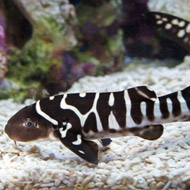
Zebra sharks are currently classified as Vulnerable on the IUCN Red List
Aquarists at The National Sea Life Centre Birmingham are celebrating the arrival of a rare baby zebra shark.
The pup, which has yet to be named, hatched on Tuesday, August 19, following a six-month incubation period, after an egg was donated from an aquarium in America.
At only 25cm long, the baby is already displaying the distinctive stripes that give this shark its name. The Centre say that is could grow to a whopping 2.5 meters in length when it reaches adulthood.
Zebra sharks are currently classified as Vulnerable on the International Union for Conservation of Nature's (IUCN) Red List of biological species. This is largely because they are sold for human consumption and for fish meat. There is also a huge market for shark-fin soup and oriental medicine.
James Robson, Curator at the National SEA LIFE Centre Birmingham, comments: “It’s always exciting when we have a new birth at the attraction, but especially in cases such as this when the species is struggling in the wild.
“We’re very happy to report that our pup is thriving. It’s currently in a nursery tank so we can keep a close eye on it but will eventually be moved to our Breed, Rescue, Protect zone where we have brown banded and horned sharks on display, alongside other developing eggs of sharks.
“The aim is to add our pup to the larger breeding population of the Zebra shark species once it comes of age in order to help protect and conserve these magnificent creatures.”
Image courtesy of the National Sea Life Centre



 The Animal and Plant Health Agency (APHA) has updated its online reporting service for dead wild birds.
The Animal and Plant Health Agency (APHA) has updated its online reporting service for dead wild birds.